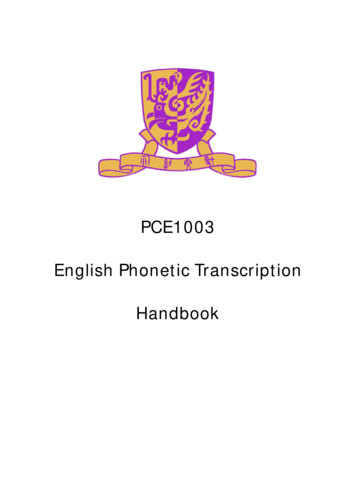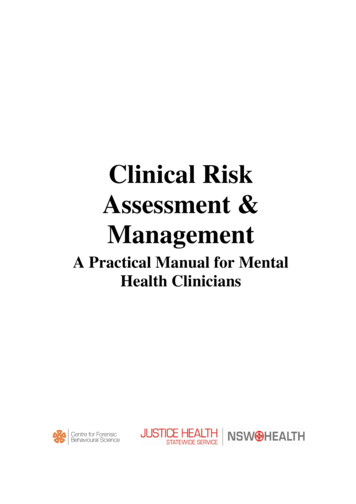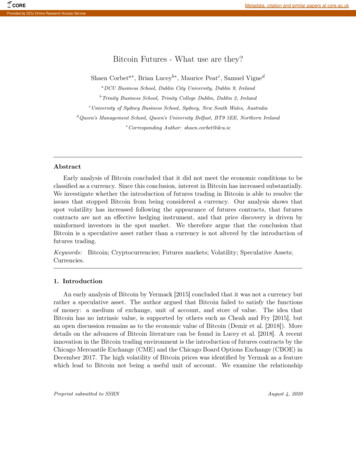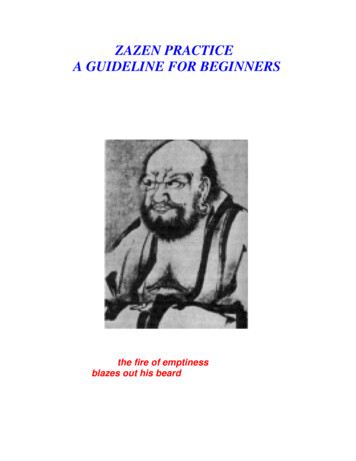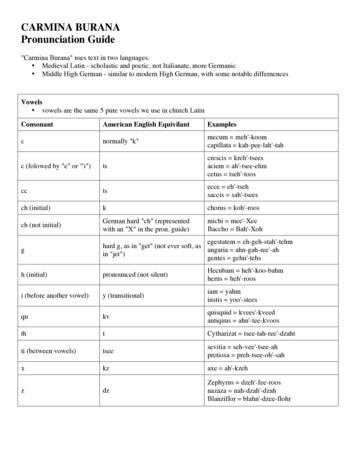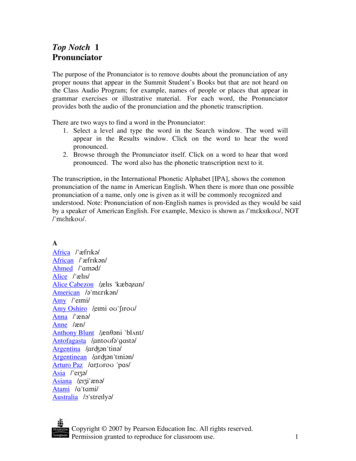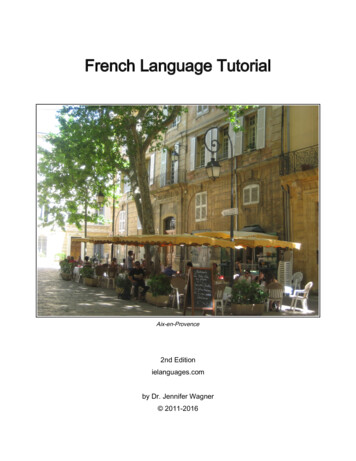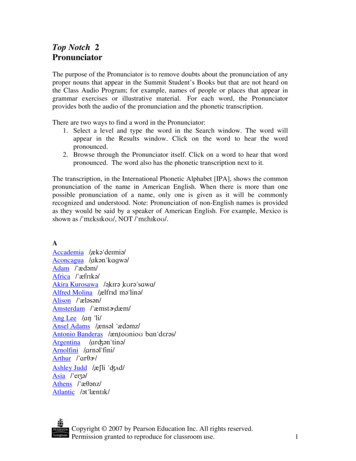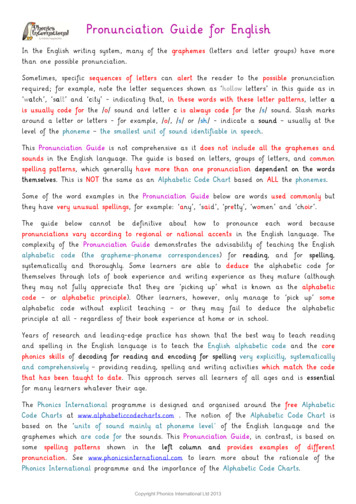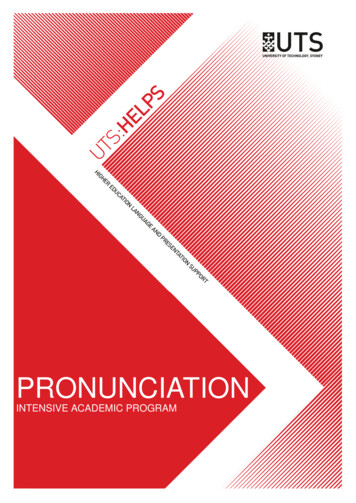
Transcription
PRONUNCIATIONINTENSIVE ACADEMIC PROGRAM
Higher Education Language & Presentation Support (HELPS)University of Technology, SydneyBuilding 1, Level 5, Room 2515 Broadway, Ultimo NSW 2007PO box 123 Broadway 2007 NSW Australia 61 2 9514 9733helps@uts.edu.auwww.helps.uts.edu.auUTS: HELPS / JULY 2016
Table of ContentsIntensive Pronunciation Program Overview .1Essential Pronunciation Features .2Group Discussion .3The Sounds of English .4Making Consonant Sounds .5Consonant Clusters/Common Mistakes .7Making Vowel Sounds.8Sounds Practice .10Diagnostic Test 1 .16Your Ideas .19Sounds – Past Tense Endings .21Stress .21Word Stress .24Stress Practice .27Frequently Used Academic Words .30Chunking and Pausing .32Chunking and Pausing in Presentations.33Chunking and Pausing Practice .34Sentence Stress .36Pausing and Focus Stress .37TED Presentation: extension activity .38Word and Focus Stress Practice.40Stress for New Information.41Signpost Words – Pausing and Stress .43Stress Practice .45Diagnostic Test 2 .46Practice Text 1 .49Practice Text 2 .50Practice Text 3 .51Practice Text 4 .52Practice Text 5 .53Connected Speech .54Intonation .60iii
Useful Resources.63How to Practise Pronunciation .68Ways of Practising Pronunciation .70Pronunciation Checklist for Presenting .72iv
Intensive Pronunciation Program OverviewObjectives: to develop an awareness of the important features of pronunciation to identify common problems for both individual and groups of students to practise listening for pronunciation features and incorporating them intodialogues, role plays and presentations to develop self-study pronunciation techniques with the use of a range of currentaudio-visual pronunciation resource dsWordsSyllablesRhythm ofSentencesReviewVowelsRhythm ofSentencesConsonantsWord EndingsPausing &ChunkingIntonationDiphthongsWord StressSentence StressConnectedSpeechPractice &FeedbackPresentationsResources &Evaluation1
Essential Pronunciation Features1. SoundsConsonants & Vowels2. Speech chunksChunking & Pausing3. StressWord stress & Sentence stress4. IntonationPitch level & Direction5. Connected speechUnstressed words and Linking6. Vocal featuresSpeed, Volume, Projection 7. Voice qualityWarm, Abrupt, Confident UTS/ELSSA Centre/ Pronunciation Fact Sheet/ Stress/ HZ ‘092
Group Discussion What is standard English? Does accent matter? Are all effective speakers of English native speakers? Which English accent do you prefer? E.g. English, American, Australian ? Do you want to totally lose your accent? What do you find most challenging abut English pronunciation? How old were you when you started to learn English? Were you taught pronunciation? Do you have a favourite English speaker? E.g. celebrity, politician, neighbour ? Do you think pronunciation is easy to teach? Why? What is your motivation for learning English? E.g. study; live and work in Australia;use in business overseas; interest ?Watch the YouTube clip of Amy Walker introducing herself in 21 different accents:https://www.youtube.com/watch?v 3UgpfSp2t6k Which accents did you find difficult/easy? Which did you like?3
The Sounds of English4
Making Consonant SoundsSome researchers believe seeing and feeling how a sound is formed physically will helpyou develop the ability to make that sound. Others think what you hear is moreimportant. What do you think?5
Go to following websites for help making English sounds:University of Iowa: http://www.uiowa.edu/ acadtech/phonetics/english/english.htmlHELPS: ish Council: mic-chart6
Consonant Clusters/Common MistakesConsonant clusters: Two or more consonants with no vowel between them. beginning of word e.g. pretty; street middle of word e.g. degree; entry; instrument end of word e.g. sift; asksConsonant clusters at the end of words can show grammatical meaning: plurals e.g. students; books past tense e.g. cooked; climbed present tense e.g. loves; thinksCommon mistakes with consonants: use a different consonant e.g. ‘light’ sounds like ‘night’ delete consonant at end of word e.g. ‘save’ sounds like ‘say’ add a vowel e.g. ‘past’ sounds like ‘pasta’Common mistakes with consonant clusters: delete them e.g. ‘first’ sounds like ‘fur’ delete some of them e.g. ‘tense’ sounds like ‘ten’ add a vowel after or between consonants e.g. ‘just’ sounds like ‘just a’; or ‘improved’sounds like ‘improve it’ pronounce a different consonant e.g. ‘fly’ sounds like ‘fry’Adapted from Forman, R. 2011, ‘Module 5: Phonemic Level’, UTS Subject 013107, UTS, Sydney; Yates, L. &Zielinski, B. 2009, Give it a Go: Teaching Pronunciation to Adults, Department of Immigration andCitizenship, Sydney.7
Making Vowel Sounds LengthThe colon (:) following the phonemic symbol signals that the vowel is long (see Sounds ofEnglish). It also depends on whether it is stressed – short vowels may seem longer in astressed syllable and long vowels may seem shorter in an unstressed syllable. Tongue positionHorizontal (how far forward or back) and vertical (how high or low in mouth).8
Diphthongs are a combination of two single vowels. We say them by starting with onevowel and gliding into another. Although they are made up of two vowels they are heardas one phoneme, not two. We put more emphasis on the first vowel than on the second.9
Sounds PracticeHewings, M. 2004, Pronunciation practice activities, Cambridge University Press, Cambridge.10
11
12
13
14
15
Diagnostic Test 11. See you later.2. Are you thirsty?3. I have to go now.4. What’s that noise?5. By tomorrow evening.6. It’s about five o’clock.7. I sent a cheque to Roy.8. It’s on television today.9. She’s upstairs in the bath.10. Peter works in a shoe shop.11. Do you really want a drink?12. I’ll go to see Sarah before July.13. Thanks a lot.14. It’s a pleasure.15. I forgot to pay Mark for the toys.16. Your jacket is on the chair outside.17. Shall I do the washing?18. Good idea.19. We’re usually home before the children.20. There’s a zoo near Hull. It’s not far.21. We bought an amazing orange and purple car. It’s in the garage.22. Can you just put the books over there by the door?Hewings, M. 2004, Pronunciation practice activities, Cambridge University Press, Cambridge.16
17
Hewings, M. 2004, Pronunciation practice activities, Cambridge University Press, Cambridge.18
Your IdeasUse these pages to make lists of vocabulary, phrases and sentences that you would liketo practise this week.Examples: sounds, vocabulary, phrases or sentences from today vocabulary, phrases or sentences from your field of study phrases and sentences that you would like to use with more confidence socially, inclass or at work phrases and sentences that may help you in a job interview, a class presentation oran exam sections of poetry you enjoy.19
20
Sounds – Past Tense Endings21
StressWhy is word stress important?Stress is one of the most important speech tools used by English speakers tocommunicate meaning. English speakers use stress to highlight information they think isimportant. In addition, every English word with more than one syllable or word part hasa defined stress pattern. You can look up a dictionary to see which syllable is stressed.English stress is as important as English sounds.How does it work?The English stress system is based on the CONTRAST between stressed and unstressedsyllables, stressed and unstressed words. Stressed syllables are longer and louder thanunstressed syllables. They also have some pitch change or movement of the voice up ordown.Basically, there are three levels of stress in English:syllable stress inwordscontrast between stressed and unstressed syllables in wordskey word stressstress in longer speech chunks, clauses or sentencese.g.e.g.focus word stressma ny peo ple be lieve/ that in an increasingly globalised world /the syllable in the stressed word which has the strongest pitchchange in a speech chunke.g. / that in an increasingly globalised world / .To listen to these phrases go helps/self-helpresources/pronunciation/stressWhat will happen if I don’t use stress?You may sabotage your communication and you may risk tiring and confusing listeners.Listeners may not be able to recognise even simple vocabulary if you stress syllablesequally or use incorrect word stress. Listeners may not follow your meaning if you don’tstress key words in information chunks.22
UTS/ELSSA Centre/Pronunciation Fact Sheet/ Stress/ HZ ‘0923
Word StressUTS/ELSSA Centre/ Pronunciation Fact Sheet/ Common word stress patterns/ HZ and MW 201024
25
26
Stress PracticeClarity English offers you online language support. It is free forall UTS students through the UTS Library. Go tohttp://www.lib.uts.edu.au/help/english-language and followthe links.The following exercises on word stress are taken from ClarityEnglish – Clear Pronunciation 2.Listen to the words then tick the answer with the correct stress.1. really really really2. report report report3. remember remember remember remember4. yesterday yesterday yesterday yesterday5. exam exam exam6. revision revision revision revision7. difficult difficult difficult difficult8. opinion opinion opinion opinion9. possible possible possible possible10. business business business businessLook at the bold words and underline/highlight those that have the stress on the FIRSTsyllable. Then watch the video and check your answers.1. What’s the most recent movie you’ve seen?2. Do you enjoy romantic comedies?3. Who’s your favourite actor or actress?4. Do you prefer eating popcorn or chocolate in the movies?5. Is going to the movies expensive in your country?27
Clarity English offers you online language support. It is freefor all UTS students through the UTS Library. Go tohttp://www.lib.uts.edu.au/help/english-language and followthe links.The following exercises on word stress are taken from ClarityEnglish – Clear Pronunciation 2.Listen to the words below. In each group, three have the same stress pattern, and one isdifferent. Underline/highlight the word that is different.1. otocopycomplicatedbusinesswoman2. nologyexperiencesympathetic3. ntertainmentcentimeterfundamentalListen to the sentences and look at the syllables in bold. Are the vowel sounds in thosesyllables weak or strong?1. She promised to provide eggs for breakfast Weak Strong2. Megan began swimming when she was seven Weak Strong3. Put the potatoes and carrots into the pot Weak Strong4. A modern car engine is a complex machine Weak Strong5. She wants to become a better musician Weak Strong6. Most musicians can play the piano Weak Strong7. We had to measure the height of a mature apple tree Weak Strong8. We expect you to do extra work before the exam Strong Weak28
Clarity English offers you online language support. It is free forall UTS students through the UTS Library. Go tohttp://www.lib.uts.edu.au/help/english-language and follow thelinks.The following exercises on word stress are taken from ClarityEnglish – Clear Pronunciation 2.The suffixes –ion, -ic, -ical, -ial and –ity sometimes affect the stress on a word. Listen toeach pair of words. When you add the suffix, does the stress stay on the same syllable ormove to a different syllable? Select ‘same’ or ‘different’.1. reviserevision11.permitpermission2. artistartistic12.historyhistorical3. publicpublicity13.celebratecelebration4. tropictropical14.economyeconomics5. informinformation15.essenceessential6. minorminority16.possiblepossibility7. practicepractical17.decidedecision8. officeofficial18.techniquetechnical9. operateoperation19.sciencescientific10. securesecurity20.describedescription29
Frequently Used Academic Words30
31
Chunking and PausingWhy are chunking and pausing important?Pausing and chunking are vital communication tools for both listeners and speakers.Speakers divide speech into ‘pieces’ or ‘chunks’ to communicate a thought or idea, or tohighlight information they think is important. This is the simplest and most effective wayto ‘package information’ for the listener. Dividing information into chunks makes iteasier for listeners to understand.What exactly are speech chunks?A speech chunk can be a word, a phrase or a whole sentence. Speech chunks can besignalled in different ways: pauses – moments of silence, sometimes very short slowing down strong stress on the last key word in the chunkWhen you are working with a written version of a spoken text, it’s handy to mark shortpauses with a single slash / and a double slash // for longer pauses.When should I use chunking and pausing?You can use pausing and chunking to: state informationThis is a powerful / give an opinionbut unfortunately flawed / emphasise a pointargument // put forward a criticismThe main problem with the argument is /the lack of hard / statistical evidence // soften a criticismI do understand /that collecting data / is difficult // contrast a pointHowever / .UTS/ELSSA Centre/Pronunciation Fact Sheet/Chunking and Pausing/HZ 0932
Chunking and Pausing in PresentationsWhen you give a presentation, it’s important to pause enough to signal that you areintroducing a new topic. Pause at the end of one section and before you start a newone. Then state the new topic and pause so the listener can get ready for newinformation.What will happen if I don’t use chunking and pausing?Speech without pauses and speech chunks can overwhelm the listener with ‘too muchinformation’. The listener may feel ‘lost’ in a ‘forest’ of words. Without chunking andpausing, it will be hard for listeners to follow your meaning and know where they are inyour presentation.Try reading the examples below. Which one do you think a listener would find easier tounderstand?Example 1Does it really matter whether people speak with an accent as long as they can be easilyunderstood many people now believe that in an increasingly globalised world we shouldaccept variations in pronunciation that is accent however there’s no point is speakingwith an accent if people can’t understand you is there?Example 2Does it really matter /whether people speak with an accent /as long as they can be easily understood?//Many people now believe /that in an increasingly globalised world /we should accept variations in pronunciation /that is / accent //However / there’s no point is speaking with an accent /if people can’t understand you / is there?//UTS/ELSSA Centre/Pronunciation Fact Sheet/Chunking and Pausing/HZ 0933
Chunking and Pausing PracticeListening Worksheet: Kofi AnnanBBC Learning English website: Talk about English, Better speaking, Episode 3 – genglish/webcast/tae betterspeaking archive.shtmlBBC presenter, Callum Robertson, and language teacher, Richard Hallows, listen to aclip from the former Secretary-General of the United Nations, Kofi Annan. They talkabout what makes Kofi Annan an effective speaker of English and ways you can practiseand improve your English pronunciation.Callum Robertson [1:28 min]: Kofi Annan is from Ghana in West Africa, and usesEnglish as an international language, in a highly effective way. In this excerpt from aspeech on globalisation, he’s asking his listeners to make sure that the process ofeconomic globalisation helps everybody in the world, the poor as well as the rich.Task 1: Pronunciation and communication strategiesListen to Kofi Annan speaking. Do you think he is an effective speaker of English?Comment on the features below.intelligibility:easy to understand, speaks clearly (example)speed:pausing:vocabulary:stress or emphasis:overall impression:34
Task 2: Chunking and pausingListen and read the transcript below [1:48].Mark the pauses with a slash (/) (// for longer fornone.UTS/ELSSA/Pronunciation resources/MW ‘0935
Sentence StressRead the questions above. Then practise saying each of the answers below in threedifferent ways. Mark the stress differently for each answer by highlighting the word(s).For example, sentence 1:Where are my books?They’re ON the TABLEDidn’t I put my books on the chair?They’re on the TABLEI thought I put my books under the table.They’re ON the table.2. At ten past eightAt ten past eightAt ten past eight3. It’s a red FordIt’s a red FordIt’s a red Ford4. She broke her legShe broke her legShe broke her leg5. He’s writing a bookHe’s writing a bookHe’s writing a book6. Pizza and saladPizza and saladPizza and salad7. The third on the rightThe third on the rightThe third on the rightHow would you answer each one differently?36
Pausing and Focus StressTED presentation by Richard St John: The 8 secrets of successThis presentation is given on the websitehttp://www.ted.com/talks/lang/eng/richard st john s 8 secrets of success.htmlThis segment begins at 1.00 of a 3.33 minute presentation.Richard St. John describes himself as an “average guy who found success doing what heloved”. He spent more than ten years interviewing people he considered successful tofind out the reasons for success. These ‘secrets’ were then distilled into 8 words, 3minutes and a successful book.Task 1: ListeningListen to the presentation and write down the 8 secrets to success.iviiviiiiviiivviiiTask 2: Controlled speakingListen to the following extract from the presentation.a. Mark the pauses with a slash (/).b. Highlight or underline the focus words.c. Practise reading the transcript using pausing and focus ove,theydon'tdoitformoney.37
esanyway.TED Presentation: extension activityListen to more of the same talk.a. Mark the pauses with (/)b. Highlight or underline the focus words.c. Compare with your partner.d. Practise reading using pausing and focus tyournosedowninsomethingandgetdamngoodat38
rs.39
Word and Focus Stress PracticeRead the following item aloud and underline words that you think should have focusstress. Then mark the word stress for those words you have underlined.Primary stress should be marked before the stressed syllable above the line andsecondary stress below the line. E.g. pro,nunci'ation.Australia and the Global Financial CrisisA year ago, Australians were preparing themselves for a long period of recession.Many companies began belt-tightening in the expectation of poor consumer demand,while individuals also started to reduce their debt in case they were to lose their job.Well, some companies did suffer, and unemployment did rise, but not nearly asmuch as expected. In fact, technically, Australia has not been in recession andconsumer confidence seems to be rising.So, why has Australia escaped the worst of the global recession? There are severalpossible reasons. One is that the Federal Government almost immediately began tointroduce stimulus packages by giving handouts and by providing for a range ofinfrastructure projects. These measures have increased retail sales and stimulatedsections of the construction industry. Moreover, China’s economy has continued togrow, so sales of resources to China have not fallen as much as expected. Other reasonsare that the Australian economy was in surplus before the Global Financial Crisis(GFC), our banks are well-regulated and the government agreed to guarantee bankdeposits for the short-term. Economists are reasonably optimistic that Australia willweather the crisis better than most countries.40
Stress for New Information41
In the following section of a presentation, underline the words or phrases that carry newinformation. Highlight any other words that you think should be stressed to convey themessage. Practise with your partner.The focus of my research is the role of music in education. It would seemthat musical training can have intellectual benefits for children. However,in many primary schools, music is a very minor part of the curriculum and isnot taken seriously. Moreover, most primary school teachers these daysreceive very little training in music.(When giving a presentation, you will be surprised how often the focus words are placedtowards the end of a sentence. Practise saying them with appropriate stress.)42
Signpost Words – Pausing and StressSignpost words (also called transition signals) such as Firstly, In other words, and It’squite clear that are used to guide the listener.These words should therefore be spoken clearly and given appropriate emphasis. Thisinvolves pausing after the word or word group, and using suitable stress and intonation.Not all signpost words should receive the same amount of stress. It depends on theirimportance in the development of your presentation. Note that a comma in punctuationindicates that a pause is likely in speech.TaskRead the sentences below and do the following: mark with / where you think you would pause. If it is a longer pause to give moreemphasis, mark with // highlight/underline any stressed words or syllables read the sentences aloud and compare with your partner.(Note that punctuation within the sentences has been removed.)a. otherhandwillataxonalcopopsmakemuchofanimpact?e. Howeverifsuchameb. InAustralia.c.d. Ontax43
utions.g. Ash. Finallyi.UTS/ELSSA/Pronunciation resources/MW 0944
Stress Practice45
Diagnostic Test 2Hewings, M. 2004, Pronunciation practice activities, Cambridge University Press, Cambridge.46
Hewings, M. 2004, Pronunciation practice activities, Cambridge University Press, Cambridge.47
Hewings, M. 2004, Pronunciation practice activities, Cambridge University Press, Cambridge.48
Practice Text 1Oh the Places You’ll Go by Dr Seuss (children’sbook)Listen to the book on YouTube (0:00-0:54):https://www.youtube.com/watch?v 1rzUTFfflr0CongratulationsToday is your dayYou’re off to great placesYou’re off and awayYou have brains in your headYou have feet in your shoesYou can steer yourself any direction you chooseYou’re on your own, and you know what you knowAnd you are the guy who’ll decide where to goYou’ll look up and down streets. Look ‘em over with careAbout some you will say, “I don’t choose to go there.”With your head full of brains and your shoes full of feetYou’re too smart to go down any not so good streetAnd you may not find any you’ll want to go downIn that case of course you’ll head straight out of town49
Practice Text 2Harry Potter and the Philosopher’s Stone(J K Rowling)Listen to Stephen Fry reading it on YouTube (0:08-2:08):https://www.youtube.com/watch?v xFJtWwTLgt4Chapter 1 – The boy who lived.Mr and Mrs Dursley, of No. 4 Privet Drive were proud to say that they were perfectlynormal thank you very much. They were the last people you would expect to be involvedin anything strange or mysterious because they just didn’t hold with such nonsense. MrDursley was the Director of a firm called Grubbings, which made drills. He was a big,beefy man with hardly any neck, although he did have a very large moustache. MrsDursley was thin and blond and had nearly twice the usual amount of neck which camein very useful as she spent so much of her time craning over garden fences, spying onthe neighbours. The Dursleys had a small son called Dudley and in their opinion, therewas no finer boy anywhere. The Dursleys had everything they wanted but they also hada secret and their greatest fear was that somebody would discover it. They didn’t thinkthey could bear it if anyone found out about the Potters. Mrs Potter was Mrs Dursley’ssister but they hadn’t met for several years. In fact, Mrs Dursley pretended she didn’thave a sister because her sister and her good for nothing husband was as ‘unDursleyish’as it was possible to be.50
Practice Text 3Kevin Rudd’s apology speechListen to it on YouTube:http://www.youtube.com/watch?v b3TZOGpG6cMI move that today we honour the Indigenous peoples of this land, the oldest continuingcultures in human history.We reflect on their past mistreatment. We reflect in particular on the mistreatment ofthose who were Stolen Generations — this blemished chapter in our nation’s history.The time has now come for the nation to turn a new page in Australia’s history byrighting the wrongs of the past and so moving forward with confidence to the future.We apologise for the laws and policies of successive
Does accent matter? Are all effective speakers of English native speakers? Which English accent do you prefer? E.g. English, American, Australian ? Do you want to totally lose your accent? What do you find most challenging abut English pronunciati
